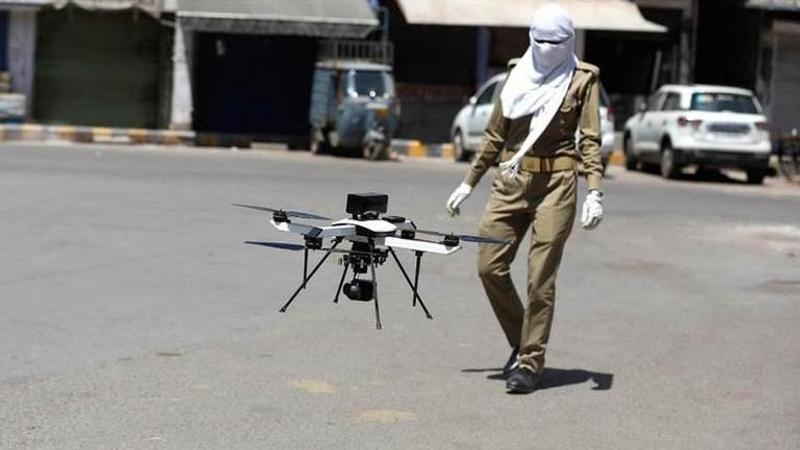Published 13:33 IST, April 12th 2020
From drones for sanitising to robots in isolation wards: How India is fighting Coronavirus
From low cost portable ventilators to drones for sanitising, robots for delivery of food and medicines to special stethoscope for examining patients from a distance — several institutions and start ups have come up with innovations to strengthen the fight against COVID-19 pandemic.

From low cost portable ventilators to drones for sanitising, robots for delivery of food and medicines to special stethoscope for examining patients from a distance and a UV technology fitted trunk for sanitising currency and grocery items — several institutions and start ups have come up with innovations to strengthen the fight against COVID-19 pandemic.
Special infection proof fabric for usage in hospitals, low-cost corona virus testing kits, isolation pods for coronavirus infected patients, bubble helmets which can be an alternative for traditional oxygen masks and pendant to raise alarm on breach of social distancing, are also among the innovative ideas that have been given shape since the coronavirus outbreak in the country.
Various mobile applications including "GoCoronaGo" to "Sampark-o-Meter" for contact tracing, calculating risk of coming in contact with a COVID-19 infected person and tracking by authorities if a person has violated quarantine, have also been developed by IITs and Indian Institute of Science (IISc), Bangalore.
While over 20 technical and scientific institutions are working on developing a vaccine for coronavirus, prominent IITs have already set up "COVID-19 specific research centres" in their institutions encouraging more developments in the innovation ecosystem.
The Indian Institute of Technology (IIT) Guwahati has taken the lead in development of various drones to aid the fight.
"While one group has developed drones for disinfection of larger areas, another group has come up with drone equipped with infrared camera which can help in thermal screening of groups without human intervention and identify suspected COVID-19 cases at an early stage once the lockdown is lifted.
"The drone also has a loudspeaker which can be used by personnel to monitor places especially with high disease prevalence and give appropriate instructions," T. G. Sitharam, Director, IIT Guwahati, told PTI.
"Another team from the institute has developed two robots which can be deployed in isolation wards for COVID-19 infected cases for delivery of food and medicine to patients and collection of contagious waste," he added.
IIT Ropar has developed a trunk-shaped device fitted with ultraviolet germicidal irradiation technology, which they recommend be placed at doorsteps and all items brought from outside including grocery and currency notes be put in it to sanitise them.
According to the team at IIT Ropar, the trunk when commercialised, can be available at less than Rs 500. The device will take 30 minutes to sanitise the items and the team has recommended a 10 minute cooling off period before one takes the items out.
An IIT Bombay start up has developed a "digital stethoscope" that can listen to heart beats from a distance and record them, minimising the risk of healthcare professionals contracting the novel coronavirus from patients.
The data or the auscultated sound from a patient’s chest is wirelessly sent to the doctor using Bluetooth, doing away with the need to go near to take readings, according to members of the team.
Sree Chitra Tirunal Institute of Medical Sciences and Technology (SCTIMST), Trivandrum, an autonomous institution under the Department of Science and Technology, has developed three new equipment for the treatment of COVID-19 patients.
"Acrylosorb, equipment to collect body fluids and dispose of it safely, is the first equipment developed which can absorb liquids at least 20 times more than its dry weight and also contains a decontaminant for in situ disinfection," a senior official said.
"Another innovation is a isolation pod that restricts COVID-19 patients from having contact with others. The isolation pod is a chamber, just like a telephone booth, for examining COVID-19 patients. The disinfected examination booth is closed like a telephone booth for examining the patient without direct contact with the doctor to prevent transmission of infection.
"It is equipped with a lamp, table fan, rack, and Ultraviolet (UV) light. The installed UV light in the booth disinfects the chamber after each patient leaves. Additionally, an entry tunnel on the side frame is provided to pass a stethoscope within the chamber. The third equipment is the bubble helmet, an alternative for the traditional oxygen masks," the official added.
IIT Roorkee and Kanpur have developed low-cost portable ventilators.
An engineering student at Punjab's Lovely Professional University (LPU) has developed a device named 'kawach' (shield) which vibrates and glows in case someone breaches the user's safe space of one metre.
The device which can be worn as a pendant comes equipped with a 'hand wash reminder' feature that beeps every 30 minutes to remind the user to wash hands. It also has a temperature sensor that sends an alert to the user through SMS in case a user's body temperature crosses the prescribed limit.
According to Union Health Ministry, the death toll due to the novel coronavirus rose to 273 and the number of cases to 8,356 in the country on Sunday.
While the number of active COVID-19 cases is 7,367, as many as 715 people were cured and discharged and one had migrated. As many as 34 new deaths have been reported since Saturday evening, the ministry said.
(Picture credit: AP)
Updated 13:33 IST, April 12th 2020




